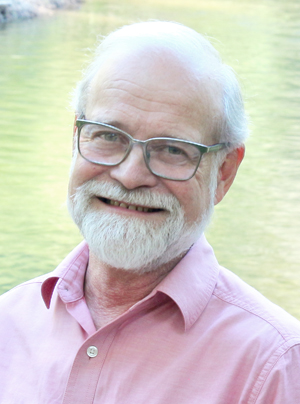Randy Haddock: Difference between revisions
No edit summary |
No edit summary |
||
| Line 4: | Line 4: | ||
Haddock is the son of Bill and Virginia Sue Haddock of Cedar Creek, Missouri. | Haddock is the son of Bill and Virginia Sue Haddock of Cedar Creek, Missouri. | ||
Haddock earned his bachelor of science in biology at Missouri Southern State College in Joplin, a master from the University of Missouri in Columbia, and a | Haddock earned his bachelor of science in biology at Missouri Southern State College in Joplin, a master from the University of Missouri in Columbia, and a PhD in entomology from Cornell University in Ithaca, New York in [[1980]]. He conducted post-doctoral research in anatomy and neurobiology at Washington University in St Louis, Missouri. He continued his research in cardiovascular disease at [[UAB]] beginning in [[1988]]. | ||
Haddock began working with Cahaba River Society as field director in August [[1991]], and retired to serve as "science director emeritus" in November [[2020]]. During his tenure, he identified the [[Plebeian sphinx moths]] as the nocturnal pollinator of the [[cahaba lily]]. | Haddock began working with Cahaba River Society as field director in August [[1991]], and retired to serve as "science director emeritus" in November [[2020]]. During his tenure, he identified the [[Plebeian sphinx moths]] as the nocturnal pollinator of the [[cahaba lily]]. | ||
Latest revision as of 08:37, 8 July 2021
Randall Haddock is an ecologist and former field director for the Cahaba River Society.
Haddock is the son of Bill and Virginia Sue Haddock of Cedar Creek, Missouri.
Haddock earned his bachelor of science in biology at Missouri Southern State College in Joplin, a master from the University of Missouri in Columbia, and a PhD in entomology from Cornell University in Ithaca, New York in 1980. He conducted post-doctoral research in anatomy and neurobiology at Washington University in St Louis, Missouri. He continued his research in cardiovascular disease at UAB beginning in 1988.
Haddock began working with Cahaba River Society as field director in August 1991, and retired to serve as "science director emeritus" in November 2020. During his tenure, he identified the Plebeian sphinx moths as the nocturnal pollinator of the cahaba lily.
References
- Nijhuis, Michelle (August 2009) "The Cahaba: A River of Riches" Smithsonian Magazine
